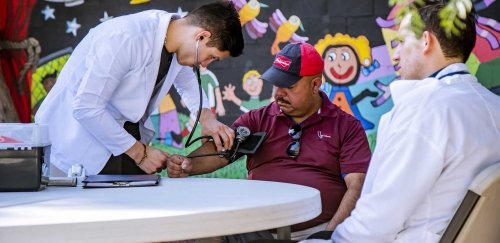Community and Public Health Program Serves a Need in Rhode Island and Beyond
- News & Events
- News
- Community and Public Health Program Serves a Need in Rhode Island and Beyond

Rhode Island College is working hard to fill the gaps in health literacy and overcome language barriers in the state.
According to the U.S. Bureau of Labor Statistics there are less than 60 thousand community and public health professionals in the country for an estimated population of 331 million. “Community and public health workers promote health and serve as advocates within a community by assisting individuals to adopt healthy behaviors, implementing programs that promote, maintain, and improve individual and overall community health,” says the bureau.
These professionals are experts who can work with communities in urban, suburban and rural settings, especially in times of public health challenges such as a pandemic. The goal of this discipline is to “improve individual and population health outcomes by assisting individuals and communities in voluntarily adopting and maintaining healthy behaviors and lifestyles,” notes Professor Soumyadeep Mukherjee, the new coordinator of the Bachelor of Science in community and public health promotion at Rhode Island College.
Mukherjee believes that increasing enrollment in these kinds of programs is key to maintaining a healthier Rhode Island in the near future. He says careers in community and public health are for those who love working with the community to help prevent diseases, lead healthy, productive lives and achieve health equity.
“According to the Bureau of Labor Statistics, healthcare occupations are projected to grow at least 15 percent between 2019-2029,” he adds. “In some states, that amount will be more or less depending on the public workforce.”
This relatively new B.S. in community and public health promotion at RIC is one of the majors that emerged from what used to be the B.S. in community health and wellness. The new major has a strong focus on improving public health through the involvement of individuals, communities and community-based organizations.
“No matter what a student’s interest is, whether they like mathematics or humanities, psychology or political sciences, biology or communications, medicine or philosophy, this B.S. has a place for individuals who have the passion to help and the desire to create change for better health for all,” says Mukherjee.
The program is divided into three tracks — Health and Aging, Women’s Health, and Public Health Promotion — and provides hands-on and in-class learning opportunities that focus on the core disciplines including epidemiology, environmental health, nutrition, health literacy, health policy, health promotion and planning health programs.
Throughout the curriculum, students explore contemporary public health challenges at local, national and global levels and study health determinants such as systemic racism, social inequities, changing climate, access to health insurance, vaccines and other forms of healthcare, and availabilities of housing, safe water and sanitation.
“Students have a full semester internship either on campus or with a local community-based organization, which can range from community health centers, hospitals, research organizations or insurance agencies,” Mukherjee explains. “Even though this is an undergrad program, we have a strong focus on health research methods, health disparities and social justice.”
He notes that Rhode Island College is working hard to fill the gaps in health literacy and language barriers in the state. “Many of our students are bilingual, and they bring in the aspect of language competency. Even those who are not multilingual learn to appreciate cultural sensitivity and humility,” says Mukherjee.
The program provides training and mentorship so that students can utilize their respective strengths to empower individuals and communities. “For example, during internship students have created manuals for school kids and their families in both Spanish and English on critically important health topics. Others have assisted organizations in grant writing, research, and drafting reports,” Mukherjee says. “During the pandemic, students have worked with schools, colleges and communities on vaccination campaigns and health promotion events, as well research projects led by program faculty.”
Graduates from this program are employed in state and local health departments, governmental and private health organizations, social service and community agencies, and non-profit and for-profit health organizations, both within and beyond Rhode Island. “Some have gone on to pursue master’s degrees in recognized public health programs such as Boston University and Emory University, and chosen to work in academia. There are others who have done all of the above,” boasts Mukherjee. “As program faculty, our duty is to help students recognize their preferences and to provide the best guidance possible.”
